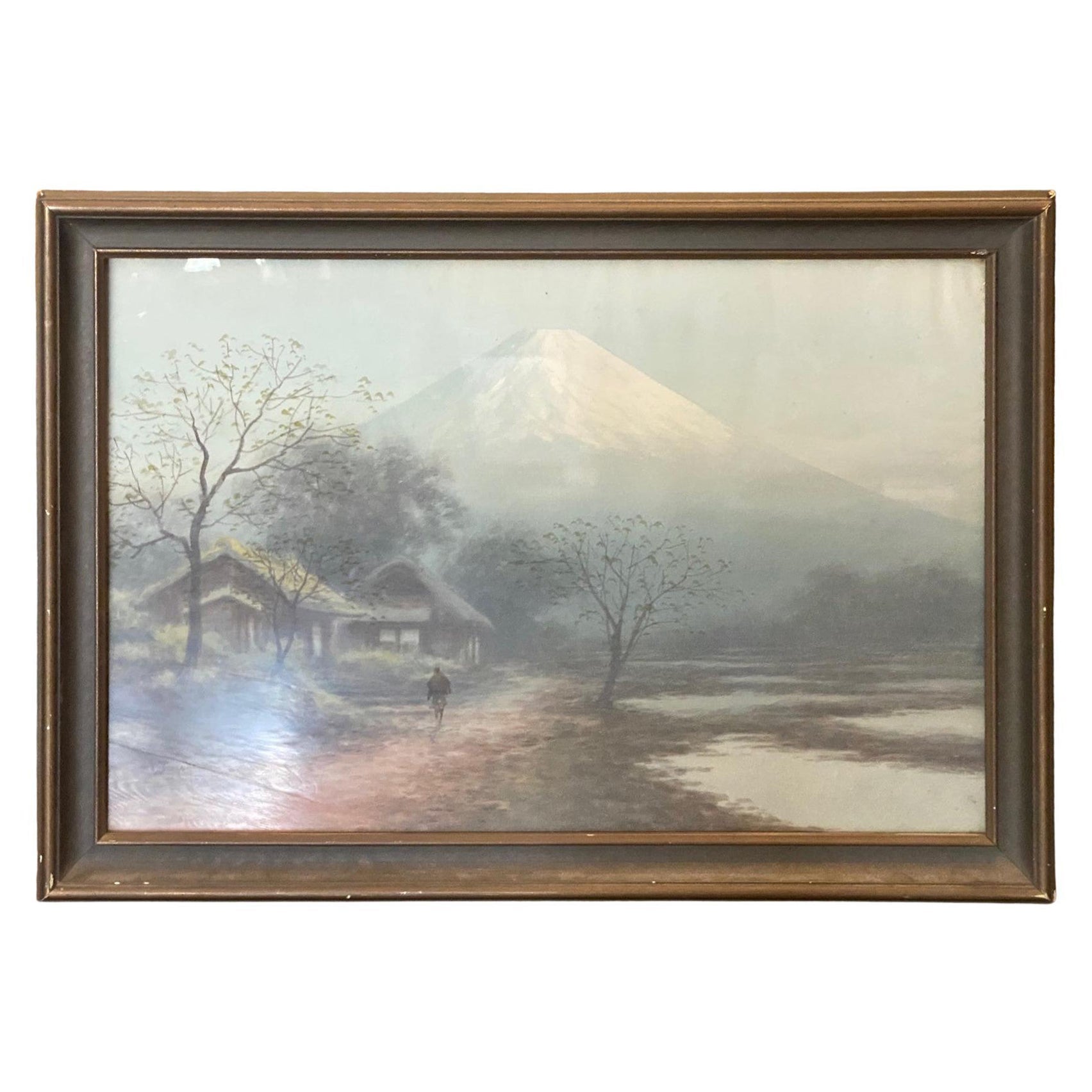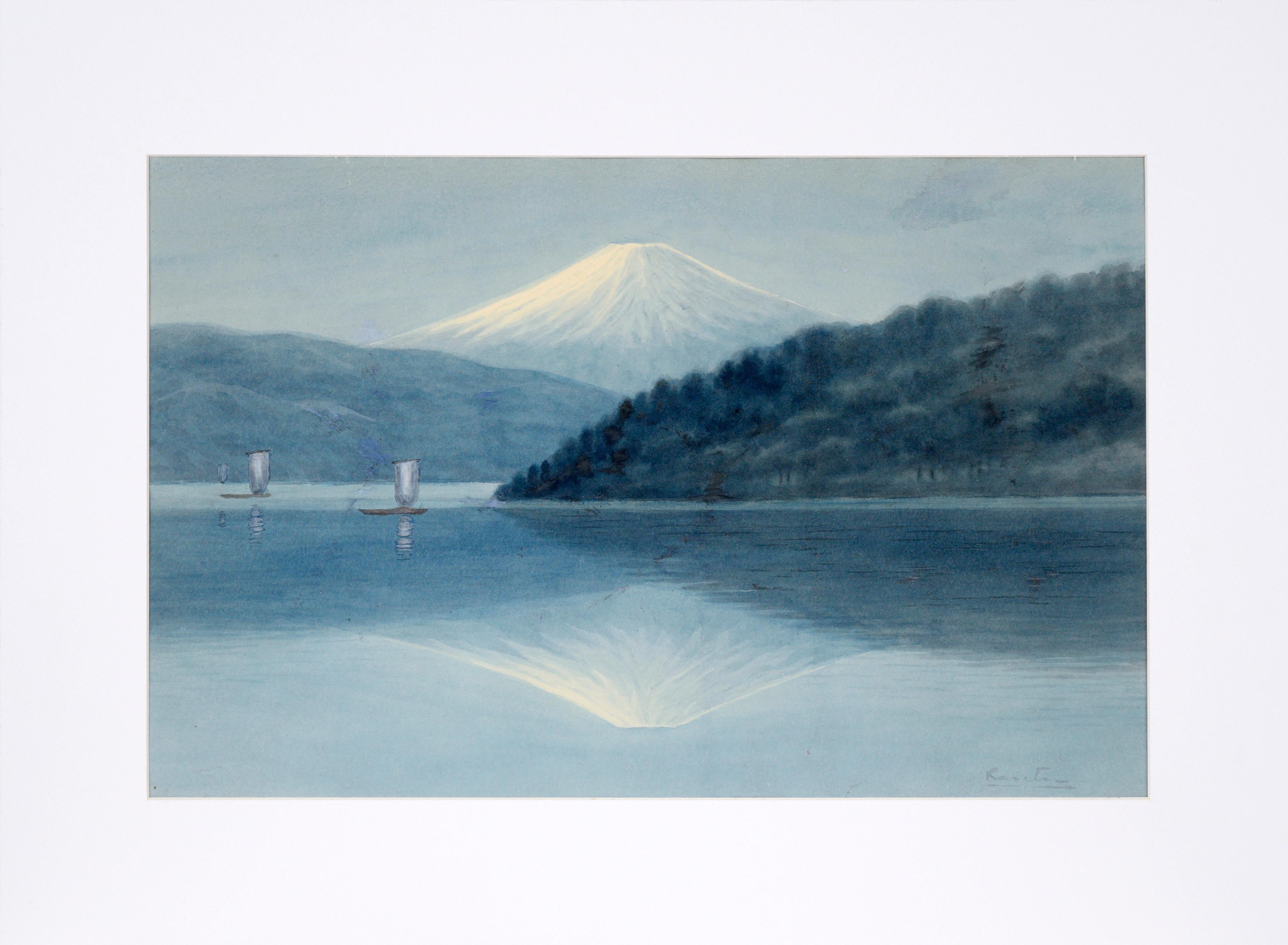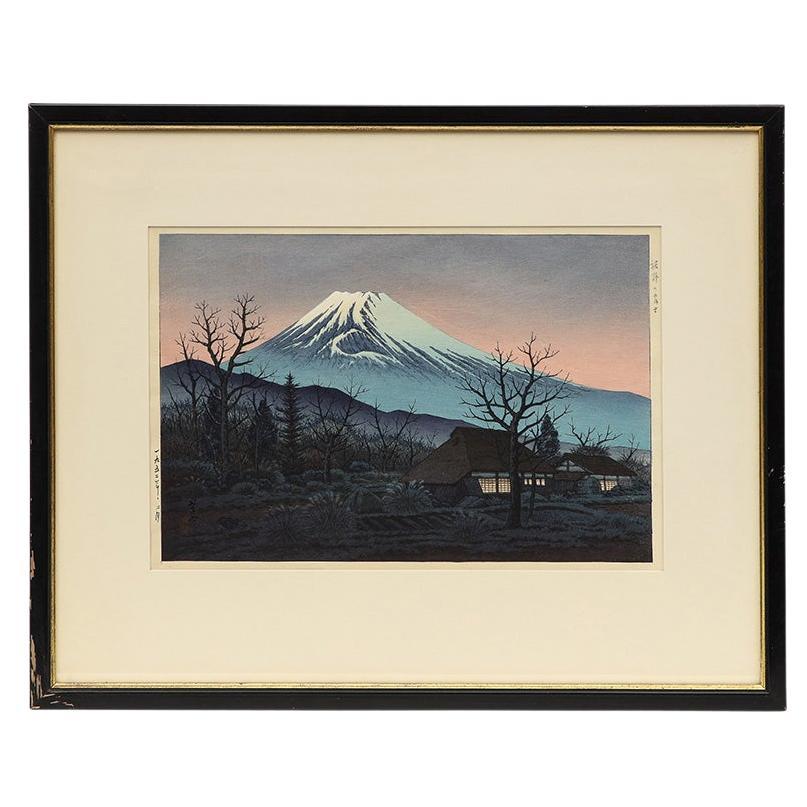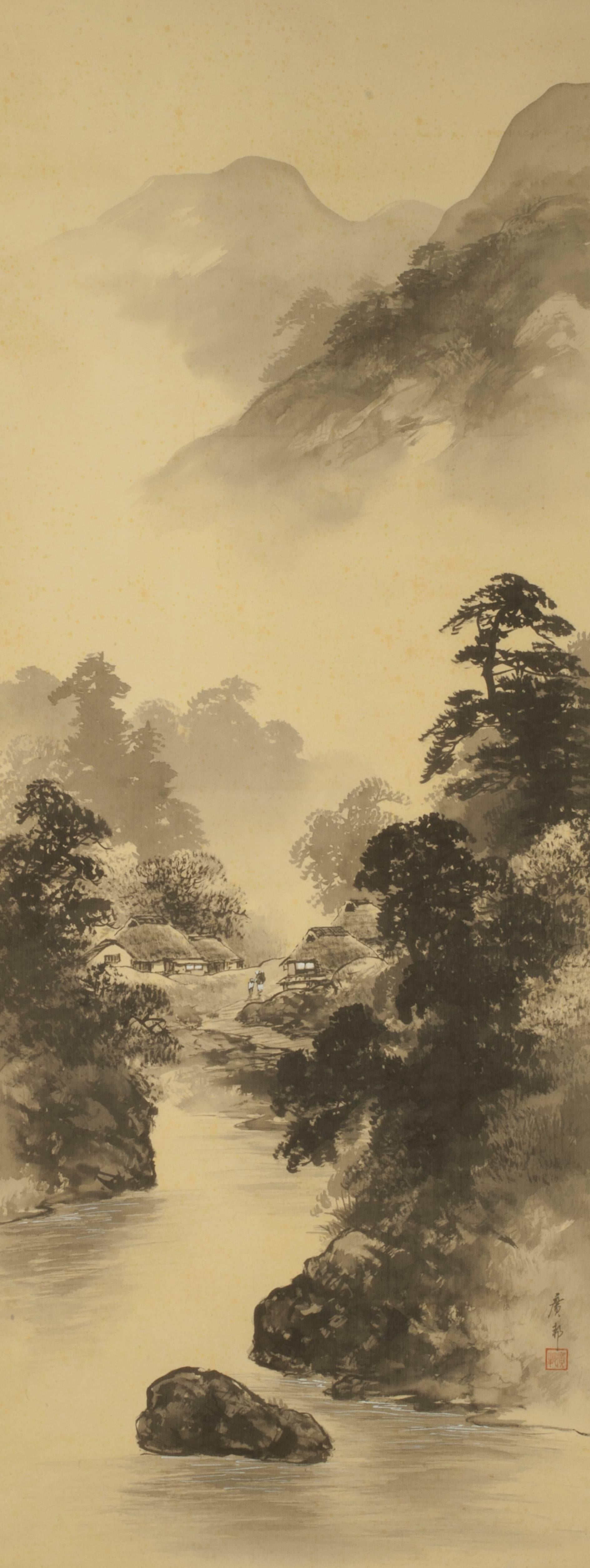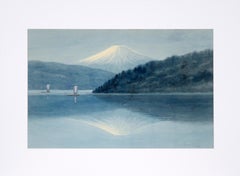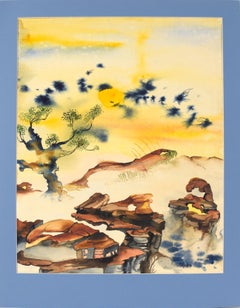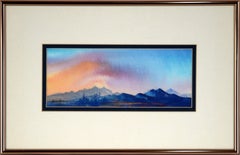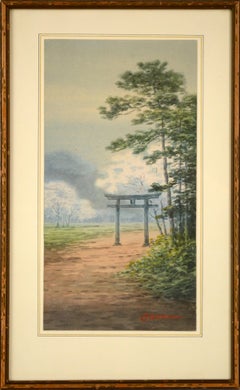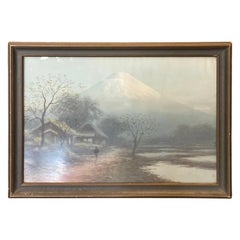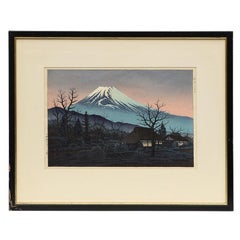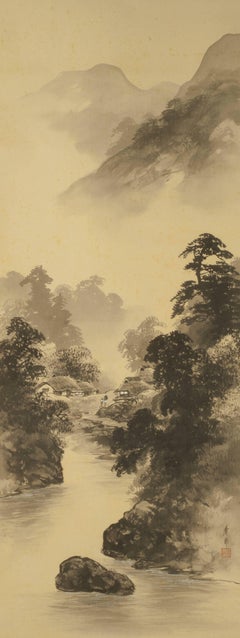Items Similar to Sunrise Over Mt. Fuji, Japanese Watercolor Landscape
Want more images or videos?
Request additional images or videos from the seller
1 of 13
Emiko SatsutaSunrise Over Mt. Fuji, Japanese Watercolor Landscapeearly-mid 20th Century
early-mid 20th Century
$2,280
$2,85020% Off
£1,743.18
£2,178.9820% Off
€2,007.79
€2,509.7420% Off
CA$3,194.98
CA$3,993.7220% Off
A$3,566.89
A$4,458.6220% Off
CHF 1,869
CHF 2,336.2520% Off
MX$43,662.28
MX$54,577.8520% Off
NOK 23,736.30
NOK 29,670.3820% Off
SEK 22,380.32
SEK 27,975.4020% Off
DKK 14,984.36
DKK 18,730.4620% Off
About the Item
Idyllic depiction of Mount Fuji by Japanese artist Emiko Satsuta (early 20th Century). Muted colors create a serene atmosphere, with Mount Fuji in the background, towering over the river and village. Reflections in the still water are expertly executed, adding a sense of depth to the foreground. Traditional Japanese Minka huts indicate that the inhabitants of the village were farmers, artisans, or merchants. Signed in the lower right corner. Presented in an ornate wood frame.
Image size: 11.75"H x 25.5"W. Emiko Satsuta was a excellent watercolor and woodcut artist in pre and postwar Japan. Little is known of this period artists that sold to re-construction tourists and visitors post-war.
- Creator:Emiko Satsuta (Japanese)
- Creation Year:early-mid 20th Century
- Dimensions:Height: 15.75 in (40.01 cm)Width: 38.5 in (97.79 cm)Depth: 0.75 in (1.91 cm)
- Medium:
- Movement & Style:
- Period:
- Condition:Some tonal ageing to cardstock. Minor scratches on frame.
- Gallery Location:Soquel, CA
- Reference Number:Seller: DBH71161stDibs: LU5429004472
About the Seller
5.0
Platinum Seller
Premium sellers with a 4.7+ rating and 24-hour response times
Established in 1986
1stDibs seller since 2014
2,963 sales on 1stDibs
Typical response time: <1 hour
- ShippingRetrieving quote...Shipping from: Soquel, CA
- Return Policy
Authenticity Guarantee
In the unlikely event there’s an issue with an item’s authenticity, contact us within 1 year for a full refund. DetailsMoney-Back Guarantee
If your item is not as described, is damaged in transit, or does not arrive, contact us within 7 days for a full refund. Details24-Hour Cancellation
You have a 24-hour grace period in which to reconsider your purchase, with no questions asked.Vetted Professional Sellers
Our world-class sellers must adhere to strict standards for service and quality, maintaining the integrity of our listings.Price-Match Guarantee
If you find that a seller listed the same item for a lower price elsewhere, we’ll match it.Trusted Global Delivery
Our best-in-class carrier network provides specialized shipping options worldwide, including custom delivery.More From This Seller
View AllReflection of Mt. Fuji on Lake, after Niimi Sei - Watercolor on Paper
Located in Soquel, CA
Reflection of Mt. Fuji on Lake, after Niimi Sei - Watercolor on Paper
A serene watercolor in subdued hues of blue and green depicting Japan's iconic Mt. Fuji. The mountain towers be...
Category
20th Century Impressionist Landscape Drawings and Watercolors
Materials
Paper, Watercolor
Vintage Watercolor Landscape with Rocks and Yellow Sun
Located in Soquel, CA
Vintage Watercolor Landscape with Rocks and Yellow Sun
Vibrant watercolor landscape painted in the East Asian landscape tradition. A saturated yellow sun rests in the middle of the ...
Category
1970s Other Art Style Landscape Drawings and Watercolors
Materials
Watercolor, Paper
"Sunrise Wave" Small Scale Landscape in Watercolor on Paper
Located in Soquel, CA
"Sunrise Wave" Small Scale Landscape in Watercolor on Paper
Colorful and vibrant sunset landscape by Karyn Gabaldon (American, b. 1954). Rows of dark blue mountains recede into the ...
Category
Early 2000s Contemporary Landscape Drawings and Watercolors
Materials
Watercolor, Archival Paper
Early 20th Century Japanese Landscape Watercolor with Torii Gate
Located in Soquel, CA
Early 20th Century Japanese Landscape Watercolor with Torii Gate
Beautiful early 20th century Japanese landscape watercolor featuring a torii gate by Shumi...
Category
Early 20th Century Impressionist Landscape Drawings and Watercolors
Materials
Paper, Watercolor
Study of Utagawa Hiroshige's "View of Hara-Juku" 53 Stations of the Tokaido Road
By Utagawa Hiroshige
Located in Soquel, CA
Study of Utagawa Hiroshige's "View of Hara-Juku" 53 Stations of the Tokaido Road
Hand painted study of Utagawa Hiroshige's "View of Hara-Juku", (by unknown artist), from "53 Station...
Category
1920s Edo Landscape Prints
Materials
Paper, Ink, Woodcut
Village at the Base of the Andes Mountains - Watercolor Landscape on Paper
Located in Soquel, CA
Lush watercolor landscape by unknown artist Erazo (20th Century). In a small village, a lone figure walks down the street, away from the viewer. A large, snowcapped mountain rises dr...
Category
Late 20th Century Impressionist Landscape Paintings
Materials
Paper, Watercolor
You May Also Like
Mount Fuji, Japan
By Tokusaburo Kobayashi
Located in San Francisco, CA
Artist: Tokusaburo Kobayashi (Japanese, 1884-1949)
Title: Mount Fuji, Japan
Year: Circa 1930
Medium: Watercolor
Paper: Wove
Size image: 9.5 x 12.5 ...
Category
Mid-20th Century Realist Landscape Drawings and Watercolors
Materials
Watercolor
S. Tosuke Signed Original Japanese Watercolor Painting of Mount Fuji Landscape
Located in Studio City, CA
A beautiful, atmospheric, and quite evocative watercolor painting of Mount Fuji towering above a small misty morning village landscape by Japanese artist/painter S. Tosuke.
The wo...
Category
Vintage 1920s Japanese Taisho Paintings and Screens
Materials
Wood, Paint, Paper
Ito Takashi Landscape Woodblock Print, "Mt. Fuji from Susono", Signed
Located in New York, NY
Ito Takashi Landscape Woodblock: Mt. Fuji from Susono. Beautiful Japanese woodblock with good colors; under glass with 1960s era matting and framing. The b...
Category
Vintage 1950s Japanese Mid-Century Modern Prints
Materials
Paper
$995 Sale Price
55% Off
Mountain Landscape
By Hijikata Torei
Located in Fairlawn, OH
Ink and gold on paper silk mounted to hanging scroll
Brush wash scroll
Signed Torei sha, sealed Hirokuni and Torei
Painting size: 42 x 16"
Scrol...
Materials
Sumi Ink
Landscape - Original Watercolor signed "Chantau Reclan" - Early 20th Century
Located in Roma, IT
Landscape is an original modern artwork signed "Chantau Reclan".
Original colored watercolor on paper.
Hand-signed by the artist on the lower right.
Good conditions.
Category
Early 20th Century Modern Landscape Drawings and Watercolors
Materials
Watercolor
Japanese Contemporary Art by Minako Asakura - Sunset Landscape
By Minako Asakura
Located in Paris, IDF
Acrylic on paper with frame
Minako Asakura is a Japanese artist born in 1973 who lives & works in Tokyo, Japan. As graphic designer & art director, she was involved for more than ...
Category
2010s Contemporary Animal Drawings and Watercolors
Materials
Acrylic, Paper
More Ways To Browse
Japanese Landscape Artist
Ornate Wood Frames
Mount Fuji
Japanese Woodcut Landscape
Sunrise Watercolor Painting
Mt Fuji
Red Landscapes Painting
Portrait Of Self
Sculpture Of Family
Oil Paintings Of Trees
Mexico City
2020 Oil Painting
California Artist Oil
Newspaper Art
California Landscape Painting
Surrealism Art
Mexican Artist Painting
Greek Artist
